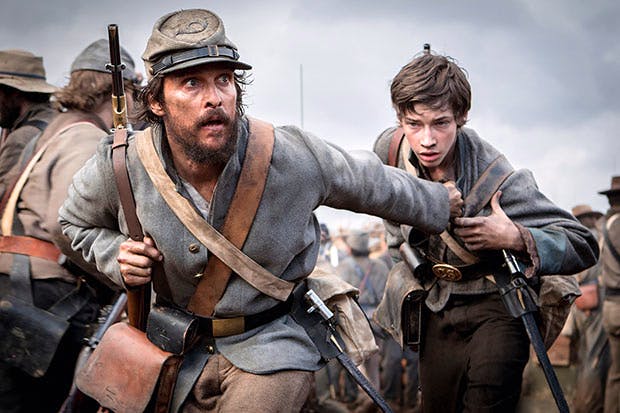Free State of Jones is an American Civil War drama ‘inspired’ by the life of Newton Knight, who led an armed rebellion against the Confederacy in Jones County, Mississippi, and one rather wishes that that was all it was about. Directed by Gary Ross (Seabiscuit, The Hunger Games), and starring a whiskery, leathery Matthew McConaughey, it tells that story, then thinks: while you’re here, might we tell another story? And another one? So you are fully educated in all matters? In the end, such is the weight of all these stories that you won’t lose the will to live exactly, but you will find it has been significantly weakened.
The film opens in 1862 and opens as you might expect. That is, bloodily and viscerally on a battlefield mid-combat as body parts fly. Knight is a medic who has had enough. He’s had enough of the carnage. He’s had enough of the politics, particularly the new ‘Twenty Negro Law’ that exempts men who own more than 20 slaves from military service. (‘It’s a rich man’s war but a poor man’s fight,’ it is noted, clearly.) And when his teenage nephew is killed, that’s it, and he deserts. To cut a long story short, for which you should be grateful, as this is a protracted business, he ends up hiding in the swamps along with a group of runaway slaves whom he feels for, just as he feels for the poor, the weak, the disenfranchised. Knight’s sense of social justice is second to none. Knight’s sense of social justice would shame Jeremy Corbyn, plus he’s handier to have about the place. He is a natural leader. (The slaves accept his leadership without question.) He can blacksmith. He can whittle fish hooks. He can roast a dog — I forgive him; needs must — and build a house.
For all I know, Knight may have been all these things, and would even take the rubbish out, in normal circumstances, but I still felt a keen hungering for the slaves to have some agency, any agency. They wouldn’t have figured out how to fish for themselves, for instance? Later, Knight leads a group to vote for the first time. Why? They’d have got lost on the way to the ballot box otherwise? This is Knight’s story, and not 12 Years a Slave, you might reasonably argue, but you will still have to buy all these slaves simply not fishing and not voting and waiting around for a nice, white fella to come along to show them how it’s done.
But back to the swamp where, before too long, our fugitives are joined by other fugitives of all ages and colours. There is some racial tension but Knight quickly puts everyone right. They form a sort of paramilitary and as their numbers grow there is some satisfaction in seeing them outmanoeuvre the Confederate army and take out that nasty lieutenant, and that nasty colonel, and triumphantly declare a ‘Free State of Jones’. But this isn’t all that is going on. Knight has begun a relationship with Rachel (Gugu Mbatha-Raw; a ‘house negro’) and the film flashes forward to ‘85 years later’ to detail an anti-miscegenation court case brought by one of their descendants. I am minded of William Faulkner’s axiom ‘The past is never dead. It’s not even the past’, but in playing it out Ross kills the momentum of the original story stone-dead. Plus, there’s a third act devoted to the post-war reconstruction, the rise of the KKK, and the beginnings of the civil-rights movement that is a monumental drag. In fact, it all becomes so sprawlingly messy that we increasingly have to rely on intertitles to tell us where we are, when, and even why.
It has its moments. It captures the horror of that war. There are those wonderfully epic American landscapes. And McConaughey brings more gravitas and intensity to the role than the role probably deserves. But what he can’t bring is complexity, as there is none. There is no moral ambiguity, character development or psychological insight. How did Knight become this impossibly good person? Where did it happen? Why did he think it fine to take up with Rachel when he was already married?
I would also dissuade you from looking up the actual story of Newton Knight as you will primarily see what Ross, in his determination to create the big historical sweep, chose to ignore. For example, Knight would have five children with Rachel and nine with his white wife and the two families lived in adjoining properties. How did that work? How did his kids with Rachel — they were known as ‘the Knight Negroes’ — feel about their white half-siblings, and vice versa? You can go small to say something big, as no one famous ever said. But it’s true all the same, I think.
Got something to add? Join the discussion and comment below.
Get 10 issues for just $10
Subscribe to The Spectator Australia today for the next 10 magazine issues, plus full online access, for just $10.














Comments
Don't miss out
Join the conversation with other Spectator Australia readers. Subscribe to leave a comment.
SUBSCRIBEAlready a subscriber? Log in